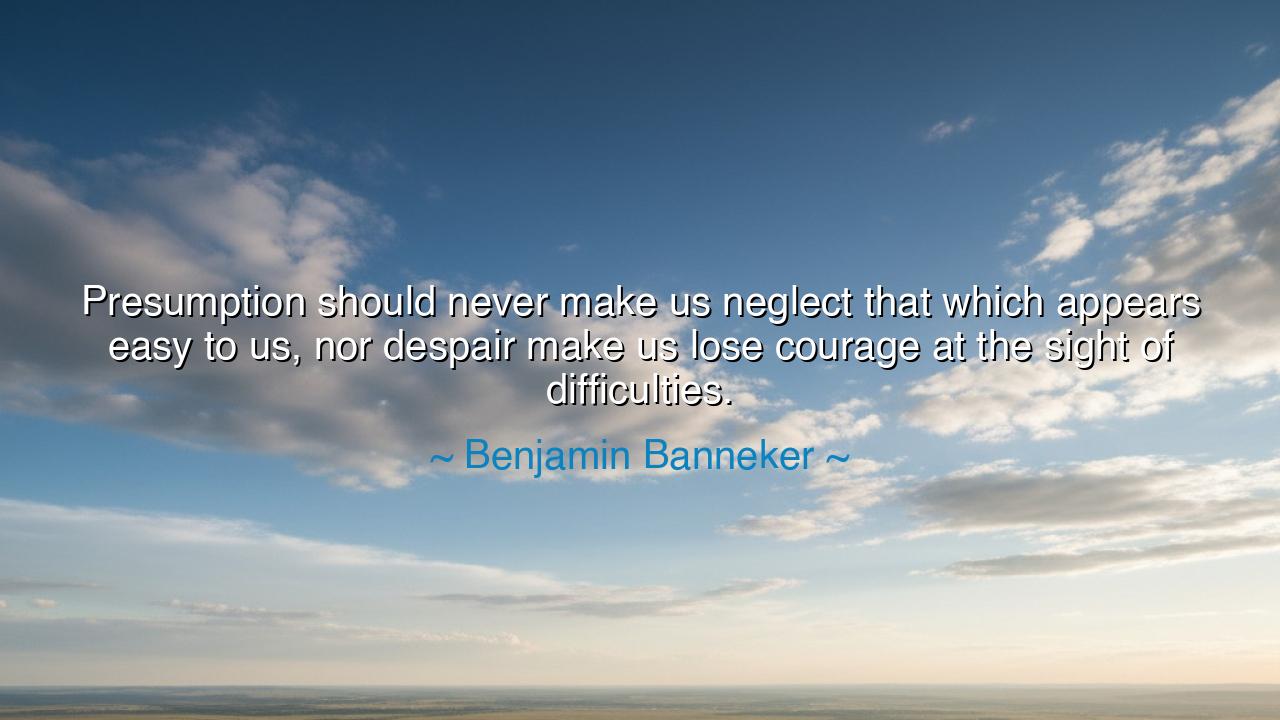
Presumption should never make us neglect that which appears easy
Presumption should never make us neglect that which appears easy to us, nor despair make us lose courage at the sight of difficulties.






In the age of reason and awakening, when men looked to the stars and measured the turning of the heavens, there lived a man of both humility and might — Benjamin Banneker, the self-taught astronomer and thinker whose wisdom still echoes across centuries. From his lips came this timeless truth: “Presumption should never make us neglect that which appears easy to us, nor despair make us lose courage at the sight of difficulties.” These words, like twin pillars, hold up the temple of balance — between pride and fear, arrogance and hopelessness, between the easy path and the steep ascent. They are the counsel of one who knew both struggle and triumph, one who carved knowledge out of darkness through sheer labor and faith.
Presumption — that subtle deceiver — is the arrogance that whispers, “This is beneath me.” It makes the proud neglect the small tasks, forgetting that the greatest triumphs rise upon humble stones. The farmer who scoffs at tending his field will reap nothing but weeds; the student who ignores the simple truths will falter before the complex. To presume is to stumble with eyes closed, believing oneself already at the summit when one has scarcely begun the climb. Thus Banneker warns us: never let ease breed neglect. For mastery is not found in the lofty only, but in the faithful completion of what lies before us, however simple it may seem.
Yet on the other side stands despair, the shadow that grips the heart when the path seems too steep, the goal too far. Despair whispers, “Why try? The mountain is too high, the night too dark.” But Banneker, who was born in chains of prejudice and poverty, refused to bow to such darkness. Denied formal education, he taught himself the movements of the stars. He built a clock from his own mind and hands when few believed he could. He faced barriers of race and circumstance that might have crushed a lesser soul — yet he did not surrender. Instead, he turned difficulty into discipline, and in doing so, proved that courage is the true measure of greatness. His life itself became a constellation of perseverance shining against the long night of ignorance.
Between presumption and despair, there lies the golden path of humility and courage. The humble man approaches every task, great or small, with care and respect; he polishes each stone of his work until it gleams. The courageous man faces difficulty not with fear, but with resolve; he knows that trials are the fires that temper the soul. The ancients taught that both arrogance and cowardice destroy the warrior’s spirit — one by blinding him, the other by paralyzing him. Only balance brings victory.
Think of the tale of Leonardo da Vinci, who never despised simplicity. He painted the smallest petal of a flower with as much devotion as the face of a saint, for he knew that mastery is born in detail. Or consider Nelson Mandela, who did not despair though he languished for decades in prison. His heart remained steady; his courage unbroken. From such examples we see Banneker’s truth made flesh — that both overconfidence and hopelessness are enemies of greatness, and that the wise soul must guard against both.
When Banneker wrote his almanacs and letters, he did not do so from a throne or a marble hall, but from a modest farm, with candlelight and patience as his companions. His genius was not born from ease, but from steadfast labor. He faced what was difficult without fear, and handled what was simple without arrogance. In this balance he found peace — and from this peace, greatness. His life speaks louder than his words: that the measure of a person lies not in what they are given, but in how they meet both ease and adversity.
Let the lesson be written upon the heart: Do not neglect the simple, nor shrink from the hard. Attend to each moment with reverence, for even the smallest act shapes your destiny. When faced with what is easy, give it your best. When confronted with what is hard, give it your heart. Remember that the universe respects effort, not presumption; persistence, not despair. The wise do not wait for conditions to be perfect — they labor with calm hands and a steady soul, trusting that every honest act carries them closer to truth.
So, children of tomorrow, walk in balance. When pride tempts you to scorn small things, remember Banneker, who found greatness in the details. When fear tells you to give up, remember his courage beneath the stars. And when your heart trembles between ease and hardship, whisper his teaching to yourself: Presume not in comfort, despair not in struggle — act always with purpose, patience, and faith. For in such action lies not only success, but the quiet, eternal happiness of a soul that has done what it was born to do.






AAdministratorAdministrator
Welcome, honored guests. Please leave a comment, we will respond soon